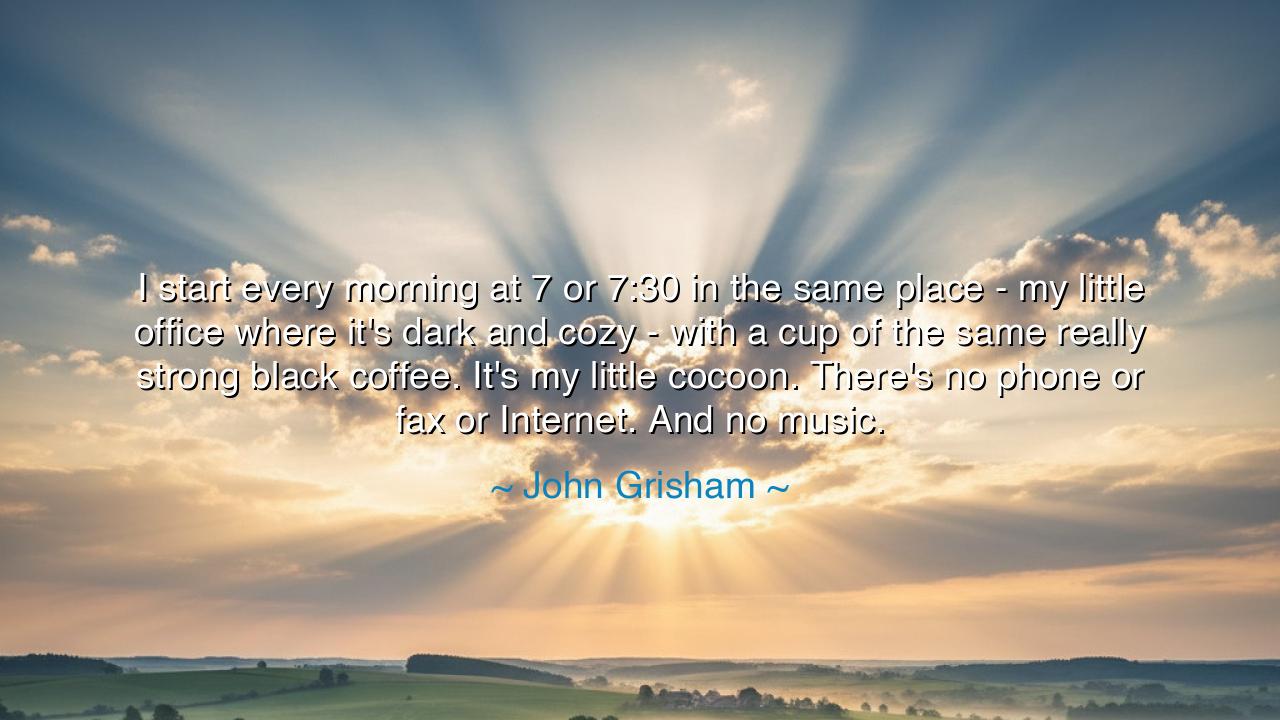
I start every morning at 7 or 7:30 in the same place - my little
I start every morning at 7 or 7:30 in the same place - my little office where it's dark and cozy - with a cup of the same really strong black coffee. It's my little cocoon. There's no phone or fax or Internet. And no music.






The words of John Grisham reveal a truth both simple and profound: “I start every morning at 7 or 7:30 in the same place – my little office where it’s dark and cozy – with a cup of the same really strong black coffee. It’s my little cocoon. There’s no phone or fax or Internet. And no music.” To some, it may sound like a routine without grandeur. Yet hidden within this ritual is the essence of discipline, the key to creation, and the sacred wisdom of withdrawing from the noise of the world to forge something lasting.
This little office, dark and without distraction, is more than a room. It is a sanctuary. In this space, Grisham shields himself from the endless interruptions of the world—no phone, no Internet, no music. For he knows what the ancients knew: the mind cannot build monuments when it is scattered. Just as the monk retreats to his cell to commune with truth, so too does the writer retreat to his cocoon, where ideas may emerge like fragile wings, growing strong in the quiet.
The ritual of coffee, too, is not merely about taste or habit. It is the symbol of preparation, the lighting of the inner flame. With each sip of his strong black brew, Grisham signals to his body and spirit: now begins the work. In ancient days, warriors sharpened their blades before battle, priests washed their hands before sacrifice, and craftsmen arranged their tools before labor. The cup of coffee is such a tool, not in itself the source of creation, but the spark that marks the crossing from ordinary life into sacred time.
History tells us of men who also built their greatness upon such daily rituals. Ludwig van Beethoven, for example, counted out exactly sixty coffee beans for his morning cup, believing precision in ritual would summon precision in thought. In the quiet of that sacred preparation, his symphonies were born. Like Grisham, Beethoven sought to control the morning, to mold it into a vessel for creativity. And like all who understand the power of routine, he treated the start of the day not as chaos to be endured, but as order to be shaped.
The absence of distraction is central. No music, no buzzing machines, no voices pulling the mind apart. In this silence, the writer hears what others cannot—the whisper of stories yet untold, the stirrings of characters waiting to live. The ancients revered silence too, for they knew wisdom does not shout but speaks softly to those who make space for it. In this way, Grisham’s cocoon is not isolation, but communion with the deepest parts of the self.
What lesson, then, must we draw? That in order to create, to build, to give birth to anything of value, we must also carve out our sacred space. Whether it is a room, a desk, a corner of the world, or even a time of day, it must be guarded against intrusion. Within it, distractions must be banished, rituals must be honored, and the heart must be focused on its highest calling. Without this, we are leaves tossed by the storm of the world, unable to root ourselves in purpose.
So let us learn from this wisdom: establish your cocoon. Do not wait for inspiration to arrive amidst the chaos of life, but instead create the conditions in which inspiration is welcomed. Begin your mornings not with noise and clutter, but with intention, with ritual, with a deliberate act that separates the ordinary from the sacred. For in that small daily discipline lies the power to shape worlds, to write stories, to forge destinies.
Thus, Grisham’s words become a teaching to the generations: find your cocoon, guard it, and return to it each day. It may be dark and quiet, it may be humble and small, but within such places the greatest works are born. The world will always clamor for your attention—but if you master your mornings, you master yourself, and if you master yourself, you master life itself.






AAdministratorAdministrator
Welcome, honored guests. Please leave a comment, we will respond soon